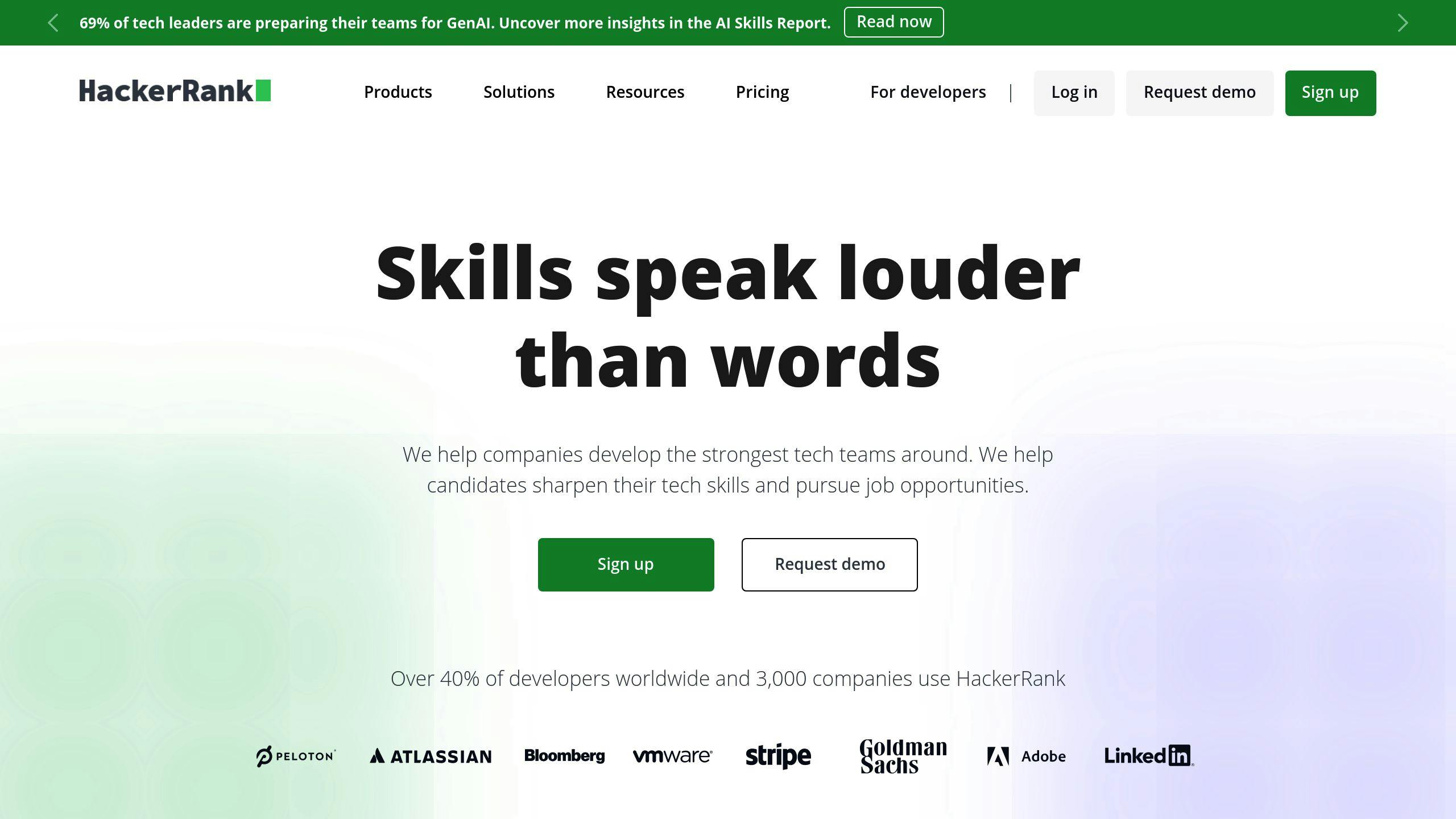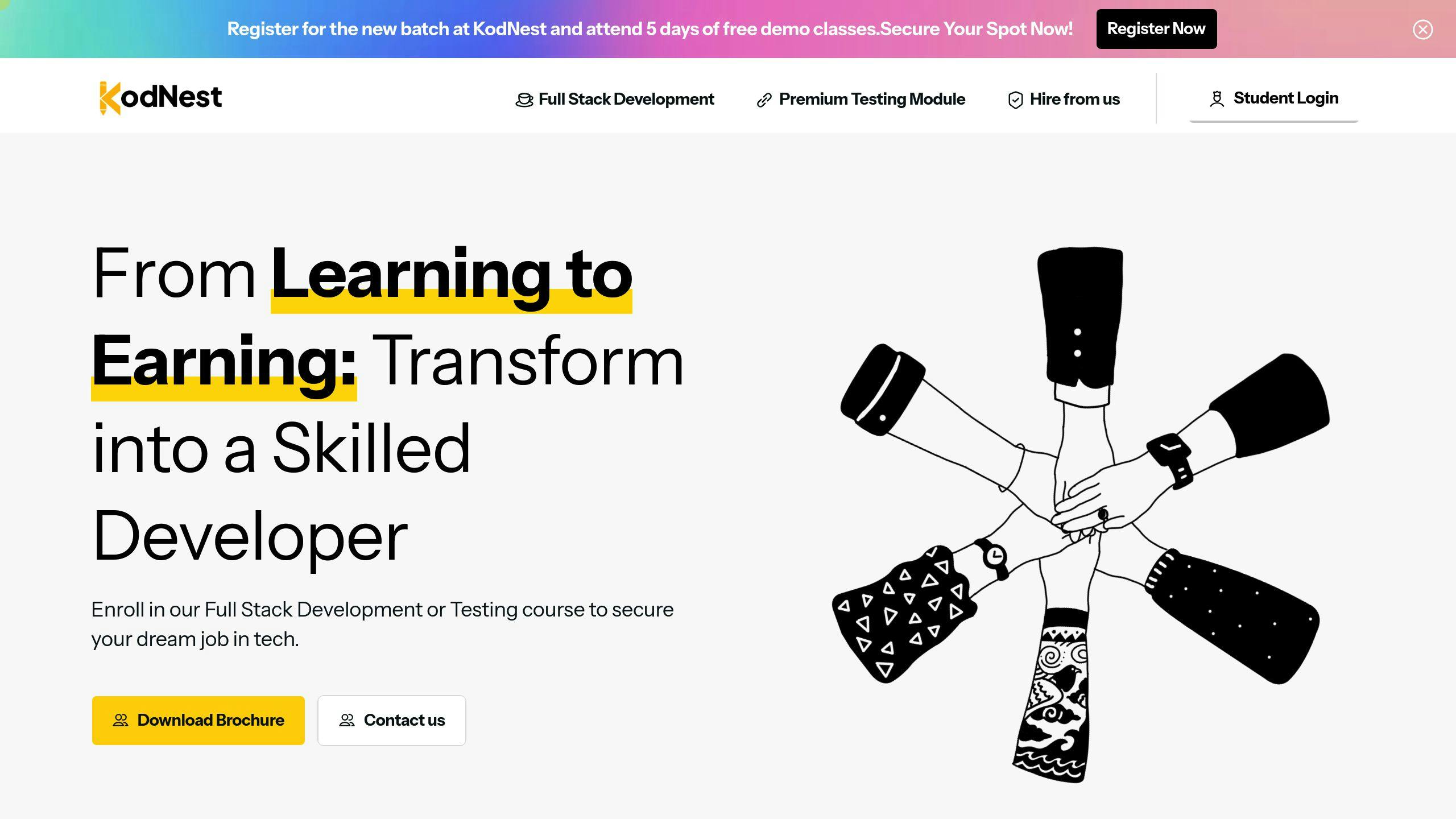HackerRank is a powerful tool to prepare for your first technical interview. It helps you improve coding skills, problem-solving, and communication through features like coding challenges, mock interviews, and skill assessments. Here’s how you can get started:
- Set Clear Goals: Focus on algorithms, problem-solving, and communication. Allocate your time wisely (e.g., 45% on algorithms, 35% on problem-solving, 20% on communication).
- Use HackerRank Features: Start with skill assessments, practice coding challenges, and simulate real interviews with mock sessions.
- Master Core Skills: Focus on sorting, graph problems, dynamic programming, and greedy algorithms. Write clean, efficient, and well-documented code.
- Simulate Interview Pressure: Use mock interviews to practice managing time, explaining solutions, and handling stress effectively.
Quick Tip: Combine HackerRank with platforms like KodNest, Scaler, or Udemy for a well-rounded preparation strategy. Focus on understanding concepts instead of memorizing solutions to build confidence and ace your interview.
HackerRank Tips with a Senior Software Engineer

Starting Your Technical Interview Prep with HackerRank
With over 11 million developers on the platform, structuring your practice is key to standing out in technical interviews.
Setting Preparation Goals
Defining clear preparation goals helps you stay on track and ensures you cover the skills needed for success. Start by identifying the requirements of your target role and evaluating your current abilities.
| Preparation Area | Focus Points | Time Allocation |
|---|---|---|
| Algorithms | Data structures, sorting, searching | 45% of practice time |
| Problem-solving | Logic, optimization, edge cases | 35% of practice time |
| Communication | Solution explanation, documentation | 20% of practice time |
Set weekly targets, concentrating on one main topic while still practicing other areas. Focus on understanding core concepts instead of just memorizing solutions. Once you’ve mapped out your goals, use HackerRank’s tools to zero in on skill gaps.
Using HackerRank’s Features
With your goals in place, HackerRank offers tools to help you focus on each area effectively:
"A strong grasp of algorithmic concepts simplifies crafting effective solutions during interviews." – HackerRank Blog [1]
Here’s how to make the most of HackerRank:
- Start with skill assessments to pinpoint weak areas, then use Problem Solving Badges to address them.
- Practice Mock Interviews to simulate real-world interview pressure with timed coding challenges.
Begin with simpler problems to build confidence, then progress to tougher challenges to mirror actual interview conditions. Use the plagiarism detector to ensure you truly understand the solutions and aren’t just copying [3].
Improving Core Skills with HackerRank Practice
HackerRank offers tools designed to help you build the skills that matter most in technical interviews.
Practicing Algorithms and Data Structures
Focus on these key problem categories to sharpen your skills:
| Problem Category | Key Areas to Practice |
|---|---|
| Sorting & Searching | Binary search, merge sort, quicksort |
| Graph Problems | DFS, BFS, shortest paths |
| Dynamic Programming | Optimization, memoization |
| Greedy Algorithms | Local optimization, decision making |
Mastering these areas will prepare you for the algorithmic challenges often featured in technical interviews.
Solving Problems with Constraints
When tackling problems, pay attention to these performance factors:
- Memory usage: Optimize how your program uses memory.
- Runtime efficiency: Ensure your code runs as quickly as possible.
- Input/output handling: Manage data effectively.
- Edge cases: Account for unusual or extreme inputs.
HackerRank provides performance metrics, such as execution time and memory usage, so you can fine-tune your solutions for better efficiency.
Writing Clean Code
Interviewers don’t just look for correct solutions – they value clean, maintainable code. HackerRank’s feedback system evaluates your submissions for both accuracy and style [1][2]. To improve your code quality:
- Use clear variable names: Make your code easy to understand.
- Keep indentation consistent: Maintain clean formatting.
- Design modular solutions: Break problems into logical functions.
- Add helpful comments: Document complex parts of your code.
Take time to review the feedback you receive. Identify common issues and work on improving your coding style with each challenge. Over time, you’ll develop habits that make your code more efficient and easier to read.
These skills will not only help you in technical interviews but also prepare you for coding challenges in real-world scenarios. HackerRank’s mock interviews provide an excellent way to test and refine these abilities.
sbb-itb-f454395
Using HackerRank’s Mock Interviews
HackerRank’s mock interviews offer a chance to simulate technical interviews, helping you sharpen your skills and boost confidence before sitting down with actual interviewers.
How Mock Interviews Work
These mock interviews mimic real technical interview settings, testing your coding abilities, analytical thinking, and communication under tight deadlines. Here’s what the platform evaluates:
| Component | Focus Area |
|---|---|
| Technical Skills | Measures your coding and problem-solving abilities |
| Time Management | Gauges how efficiently you work under pressure |
| Communication | Looks at how well you explain your solutions |
Turning Feedback Into Growth
Detailed feedback is your secret weapon. Use it to improve coding techniques, refine your problem-solving methods, and manage your time better. Here’s how:
- Spot recurring patterns in how you approach problems.
- Monitor your progress over time to see where you’re improving.
- Pinpoint weak spots that need extra attention.
It’s not just about coding – learning to handle time and pressure effectively is just as critical for success during interviews.
Gaining Confidence for Interviews
Practicing with HackerRank’s mock interviews helps you tackle the stress and time constraints of real interviews. Focus on these key areas:
Managing Your Time Wisely:
- Plan your approach before diving into coding.
- Allocate time for both writing and testing your code.
- Strike a balance between analyzing the problem and implementing a solution.
Preparing for the Interview Setting:
- Get comfortable explaining your thought process while coding.
- Practice engaging in technical discussions with confidence.
- Develop strategies for navigating tough or unexpected questions.
The more you practice, the better equipped you’ll be to handle high-pressure situations. Regular mock interviews not only improve your technical skills but also build the composure you need to excel when it matters most [1][2].
Additional Resources for Preparation
While HackerRank is a great tool for coding practice, combining it with other platforms can help you better prepare for technical interviews.
KodNest: Full Stack Development Training

KodNest can boost your interview preparation by offering:
- Real-world projects to demonstrate your skills during interviews
- Mock interviews with detailed feedback to improve your performance
- Practical problem-solving exercises for hands-on learning
- Career guidance tailored to help you succeed in interviews
Other Learning Platforms to Explore
Pairing HackerRank with other platforms can round out your preparation strategy:
-
Scaler offers:
- Comprehensive courses on data structures and algorithms
- System design workshops
- Live coding sessions led by industry professionals
-
Udemy provides:
- Courses tailored to specific programming languages and interview needs
- Regular updates to stay aligned with current trends
- Flexible, self-paced learning options
-
UpGrad focuses on:
- Programs created in collaboration with leading universities
- Guidance from industry experts
- Learning paths designed to align with interview requirements
Building a Balanced Strategy
- Use HackerRank for consistent coding practice.
- Gain hands-on experience with KodNest’s practical projects.
- Fill in knowledge gaps with Scaler, Udemy, or UpGrad.
- Apply what you’ve learned across these platforms to strengthen your understanding.
This multi-platform approach can help you tackle interviews with confidence.
Conclusion: Tips for Your First Technical Interview
Getting through your first technical interview takes preparation and a clear strategy. Combining consistent practice with smart techniques can make a big difference. Here are some key tips to help you get ready.
Focus on the basics. Spend time practicing on platforms like HackerRank, but don’t just memorize solutions. Instead, aim to understand core concepts. Algorithms and data structures are especially important since they’re the foundation of most technical interview questions [1].
Communicate your thought process. During the interview, explain your approach step by step. Use clear frameworks, like STAR, to keep your answers structured. Be concise but make sure you show how you think through problems and arrive at solutions.
Manage your time and write clean code. Break problems into smaller steps to save time. Start with a simple solution, then refine it. Pay attention to code quality – use clear variable names, format consistently, and add comments when needed to make your code easy to follow.
Use a variety of learning tools. While HackerRank is great for coding practice, don’t stop there. Platforms like KodNest can help you work on real-world projects, Scaler offers deeper dives into algorithms, and courses on Udemy or UpGrad provide flexible, structured learning options.
FAQs
Here are answers to some common questions about succeeding in a HackerRank interview, building on the strategies discussed in this guide.
How to pass a HackerRank interview?
To perform well in a HackerRank interview, follow these steps:
Before the Interview
- Get a good night’s sleep to stay focused.
- Practice timed challenges to get comfortable with HackerRank’s interface and working under time constraints [1].
- Review your best solutions to reinforce confidence in your problem-solving skills [3].
During the Technical Assessment
- Clarify edge cases and input/output requirements before you start coding.
- Break down complex problems into smaller, easier-to-tackle parts.
- Explain your thought process as you code to showcase your reasoning [1][2].
By mastering these basics and using HackerRank’s platform effectively, you’ll improve your chances of success.
What should I focus on during preparation?
Here are some key areas to prioritize:
| Focus Area | Why It Matters | How to Practice |
|---|---|---|
| Algorithm Practice | Helps solve common interview problems efficiently | Work on one medium-level algorithm challenge daily, focusing on sorting and dynamic programming. |
| Clean Code Writing | Reflects professional coding standards | Practice self-documenting code with clear variable and function names. |
| Time Management | Vital for completing challenges within time limits | Set personal time limits for solving practice problems. |
| Communication Skills | Demonstrates clear thinking and problem-solving ability | Record yourself explaining solutions and review for clarity. |
How can I make the most of mock interviews?
To get the most out of mock interviews:
- Recreate timed interview conditions to build confidence and sharpen your problem-solving skills.
- Use feedback from each session to make adjustments and improve.
- Practice explaining your solutions clearly, especially for complex problems [1][2].
- Track your progress over multiple sessions to spot trends and focus on areas needing improvement.
For more tips on algorithms and clean code, check out the ‘Improving Core Skills’ section earlier in this guide.





